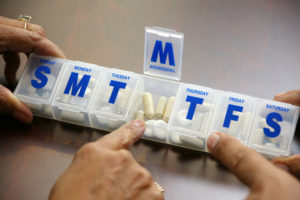As people age, they often wind up taking multiple prescription medications, which increases the risk of harmful drug interactions. The more you know, and the more you communicate with your doctors, the more you can ensure that your medication usage remains safe and effective.

People getting ready to take their pills
Medications can play an important role in your health, especially as you grow older. With advancing age comes an increased chance that you will develop one or more chronic illnesses, and appropriate medication can help you live a longer and more active life. However, with a growing number of prescription medicines available, as well as a growing population of older adults, the potential for medication safety problems continues to increase.
Recently, the Centers for Disease Control and Prevention (CDC) took a long look at the short-term, severe harm that results from medicines taken by people outside of hospital settings. The CDC estimated that more than 700,000 individuals are seen in hospital emergency departments for adverse drug events each year in the United States, and nearly 120,000 of these patients need to be hospitalized for further treatment.
“This represents a serious patient safety issue, and one of the biggest reasons this has become a problem is that many people simply don’t understand the significance of putting foreign substances in their bodies,” says Sukaina Virani, PharmD., pharmacist with Walgreens in Altamonte Springs. “Taking any medication is serious business, but we live in a society where doctors are quick to prescribe medication and patients are quick to take it without asking questions. For seniors, this casual approach can be especially dangerous.”
Virani explains that as people age, there is an increased likelihood that they will be prescribed more than one kind of prescription medication, often from different doctors and specialists. This, she says, increases the risk for drug interactions, mix-ups, and the potential for side effects. When one doctor doesn’t know what the other doctor has prescribed, they can unknowingly prescribe drugs whose combined effects cause adverse reactions.
“Medicare patients can be on five or six meds at once, and the more you’re on, the greater the chance of adverse interactions,” she says. “Combinations of drugs can cause dizziness, drowsiness, dangerously low blood pressure or even internal bleeding. It all depends on how certain medications metabolize in your body and interact with other meds, but the point is that if you have more than one doctor, you need to make sure they are communicating and that each of them knows what the others are prescribing.”
In a recent safety guide created specifically for patients and caregivers, Pfizer reported that effects of aging cause older adults’ bodies to process and respond to medicines differently than those of younger people. Age-related changes in the liver, kidneys, central nervous system, and heart are among the contributing factors that make seniors more vulnerable to overdoses and side effects. Additionally, age-related challenges like memory loss or poor eyesight can make it harder to follow instructions.
“At least once a week, I get a call from a senior who says he or she either took the wrong medication or took the morning ones instead of the evenings ones,” says Virani. “I remind them that they should have the appropriate medicine boxes, reminder systems or phone applications that they need in order to take their medications correctly. For family members or friends who have loved ones suffering from dementia, I can’t stress enough that you make sure someone trustworthy is around to help them stay on schedule.”
Remaining Diligent and Informed
The good news is that many of the potential hazards associated with prescription and over-the-counter medication usage can be avoided by following certain simple guidelines. For example, the U.S. Food and Drug Administration (FDA) suggests that you take your medicine regularly and according to your health care provider’s instructions, and that you don’t skip doses or stop taking medication without first consulting your provider.
“One of the best ways to ensure safe prescription drug use is to talk to your doctor or pharmacist if you have any questions about your meds,” says Virani, who understands that patients often fear talking with their doctors. “I can tell you that as pharmacists, we’re here to help, and we can easily identify potential adverse interactions once you tell us what you’re taking. This is your life; you can’t be blasé about it.”
Virani admits that getting a handle on someone’s prescription drug usage can be challenging because seniors tend to have different specialists, and they sometimes use multiple pharmacies to get their medications filled. With all of these variables, it is imperative that doctors, pharmacists and patients approach prescribing and filling medicine as a team. When everyone is on the same page, she says, there’s less of a chance that something bad will happen.
“Many safety issues should be considered when it comes to medication, and some aren’t as obvious as others,” adds Virani. “From wearing medical alert bracelets to not sharing prescription drugs with other people, from disposing medication properly to not taking expired meds, these are all issues we come across regularly, and seniors should be aware of them and know what to do.”
***
One Senior Place is a one-stop resource and information marketplace. Completely unique, One Senior Place provides information, counseling, referrals, educational events and direct access to independent senior-focused businesses– all under one roof! To schedule a free consultation with an Aging Services Expert call 866-706-9386.


